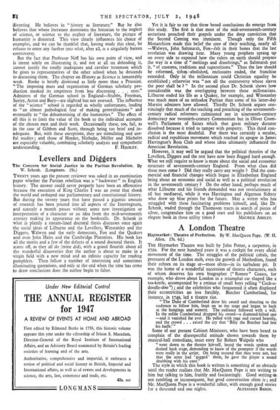Levellers and Diggers
The Concern for Social Justice in the Puritan Revolution. By W. Schenk. (Longmans. 15s.)
TWENTY years ago the present reviewer was asked in an examination paper whether the Puritan rebellion was a " backwater " in English history. The answer could never properly have been an affirmative because the execution of King Charles I was an event that shook the world and reshaped our parliamentary and constitutional history. But during the twenty years that have passed a gigantic amount of research has been poured into all aspects of the Interregnum, and scarcely a month passes without some new investigation or interpretation of a character or an idea from the mid-seventeenth century making its appearance on the bookstalls. Dr. Schenk in what is plainly a stream-lined doctoral thesis discusses once again the social ideas of Lilburne and the Levellers, Winstanley and the Diggers, Walwyn and the early democrats, Fox and the Quakers and even John Hales and the Cambridge Platonists. His book has all the merits and a few of the defects of a sound doctoral thesis. It starts off, as they all do (mine did), with a grand flourish about all the wonderful discoveries that the author is about to make in a virgin field with a new mind and an infinite capacity for reading pamphlets. Then follow a number of interesting and sometimes illuminating quotations, and only at the end when the time has come to draw conclusions does the author begin to falter.
Yet it is fair to say that three broad conclusions do emerge from this study. The first is that most of the mid-seventeenth-century sectarians preached their gospels under the deep conviction that the Second Coming was imminent. Though only the Fifth Monarchists made this belief the core of their teaching, nearly all —Walwyn, John Saltmarsh, Fox—felt in their bones that the last revelation was drawing near. Many young prophets sprang up on every side to expound how the rulers on earth should prepare the way in a time of "meltings and dissolvings," as Saltmarsh put it, " of customs, traditions and superstitions." Thus the law should be reformed, tithes.-abolished, enclosures ended, the franchise extended. Only in the millennium could Christian equality be established • otherwise was " not all the controversy whose slaves the poor shall be ? " In the second place Dr. Schenk shows how considerable was the overlapping between these millenarians. Lilburne ended his life as "a Quaker, for example, and Winstanley was much more of an orthodox Puritan than some of his latter-day Marxist admirers have allowed. Thirdly Dr. Schenk argues con- vincingly that much of the teaching and preaching of the seventeenth- century radical reformers culminated not in nineteenth-century democracy nor twentieth-century Communism but in Oliver Crom- well's Parliament of Saints which that great military dictator dissolved because it tried to tamper with property. This third con- clusion is the most doubtful. For there was certainly a secular, radical and republican movement which reached its apogee in James Harrington's Rota Club and whose ideas ultimately influenced the American Revolution.
However, it may well be argued that the political theories of the Levellers, Diggers and the rest have now been flogged hard enough. What we still require to know is more about the social and economic structure of seventeenth-century England. From what class did these men come ? Did they really carry any weight ? Did the com- mercial and financial changes which began in Elizabethan England bring about an economic and social as well as a political revolution in the seventeenth century ? On the other hand, perhaps much of what Lilburne and his friends demanded was not revolutionary at all but mediaeval, while it was Harrington and Algernon Sidney who drew up blue prints for the future. May a writer who has struggled with these fascinating problems himself, and, like Dr. Schenk, waded through the Thomason tracts in search of pieces of silver, congratulate him on a good start and his publishers on an elegant book in these utility times ? MAURICE ASHLEY.






































 Previous page
Previous page